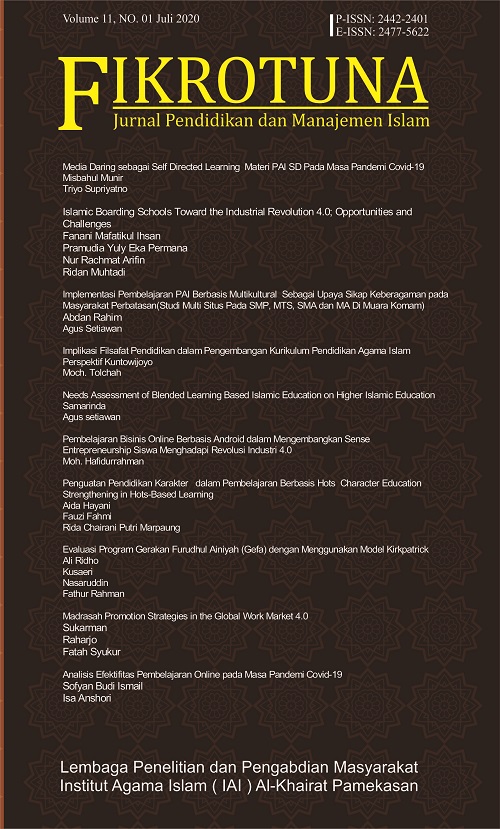Analisis Urgensi Pendidikan Kewirausahaan, Pengaruh Orientasi Kewirausahaan dan Spritual Pemasaran Terhadap Kemampuan Pemasaran
DOI:
https://doi.org/10.32806/jf.v16i02.6261Kata Kunci:
Pemasaran Spiritual, Orientasi Kewirausahaan, Kemampuan Pemasaran, Keunggulan Kompetitif UMKM BerkelanjutanAbstrak
Memasuki era globalisasi dan perdagangan bebas, serta semakin majunya teknologi menyebabkan persaingan bisnis menjadi semakin kompetitif, baik di pasar domestik maupun internasional. Tujuan penelitian ini adalah untuk mengetahui Pengaruh pengaruh Pemasaran Spiritual dan Orientasi Kewirausahaan terhadap Kemampuan Pemasaran dan Keunggulan Kompetitif UMKM Berkelanjutan. Penelitian ini tergolong penelitian explanatory research dengan pendekatan kuantitatif. Sampel yang digunakan adalah sebanyak 100 Manajer UMKM di Sumenep dengan teknik Purposive Sampling. Jenis data yang digunakan adalah data primer, yaitu pengumpulan data dengan menggunakan kuesioner. Analisis data yang digunakan ialah Analisis Regresi Linier Berganda dengan alat bantu SPSS. Hasil penelitian ini menunjukkan bahwa Pemasaran Spiritual berpengaruh positif dan signifikan terhadap Kemampuan Pemasaran, Pemasaran Spiritual berpengaruh positif dan signifikan terhadap Keunggulan Kompetitif UMKM Berkelanjutan, Orientasi Kewirausahaan berpengaruh positif dan signifikan terhadap Kemampuan Pemasaran, Orientasi Kewirausahaan berpengaruh positif dan signifikan terhadap Keunggulan Kompetitif UMKM Berkelanjutan dan Kemampuan Pemasaran berpengaruh positif dan signifikan terhadap Keunggulan Kompetitif UMKM BerkelanjutanReferensi
Afuah, A. Innovation Management: Strategies, Implementation, And Profits. New York, NY: Oxford University Press, 1998.
Alifahmi, Hifni. Spiritual Marketing Communications. Jakarta: Arga Publishing, 2008.
Aziz, N. N. A., & Samad, S. “Innovation and competitive advantage: Moderating effects of SMEs in foods manufacturing SMEs in Malaysiaâ€, Procedia Economics and Finance, Vol. 35, No. 5, (2016).
Bull, I., & Willard, G. E., “Towards A Theory Of Entrepreneurshipâ€, Journal of Business Venturing, Vol. 8, No. 3, (1993).
Bygrave, W. D. “Theory Building In The Entrepreneurship Paradigmâ€, Journal of Business Venturing, Vol 8, No 3, (1993).
Chamidah, N., Guntoro, B., & Sulastri, E. “Marketing communication and synergy of Pentahelix strategy on satisfaction and sustainable tourismâ€. Journal of Asian Finance, Economics and Business, Vol 7, No. 3, (2020).
Drucker, P. F.. Innovation and Entrepreneurship Practices and Principles (New York, NY: Harper & Row, 1985).
Farid, Kewirausahaan Syariah. Jakarta: Kencana, 2017.
Ferreira, J., Coelho, A., & Moutinho, L. “Dynamic capabilities, creativity, and marketing capability and their impact on competitive advantage and firm performance: The moderating role of entrepreneurial orientationâ€. Technovation, Vol. 92-93, No. 5, (April–May 2020).
Hughes, M., Chang, Y. Y., Hodgkinson, I., Hughes, P., & Chang, C. Y. “The multi-level effects of corporate entrepreneurial orientation on the business unit radical innovation and financial performanceâ€. Long Range Planning, Vol. 54, No. 101989, (2021).
Humas Kementerian Koperasidan UKM, “Ratio Wirausaha Indonesia Naik Jadi 3,1†(Siaran Pers), www.depkop.go.id, 11 Maret 2017.
Lee, J. S., & Hsieh, C. J. “Research in relating entrepreneurship, marketing capability, marketing capability, and sustained competitive advantageâ€. Journal of Business & Economics Research, Vol 8, No. 9, (September, 2010), 109-120.
Leibenstein, H.. “A Branch Of Economics Is Missing: Micro-micro theoryâ€, Journal of Economic Literature, Vol, 17, No. 2, (1979).
Monteiro, A. P., dkk, “Linking intangible resources and export performanceâ€. Baltic Journal of Management, Vol. 4, No. 3, (2017).
Porter, M. E. “Clusters and the New Economics Of Competitionâ€, Harvard Business Review, Vol. 76, No. 6, (1998).
Prakoso, B. “The effect of market orientation, innovation, and learning orientation on company performance to achieve competitive advantage: Empirical study of the manufacturing industry in Semarangâ€. Journal of Management and Organization Studies, Vol 2, No 1, (2005).
Pratono, A. H., Darmasetiawan, N. K., Yudiarso, A., & Jeong, B. G. “Achieving sustainable competitive advantage through green entrepreneurial orientation and market orientation: The role of inter-organizational learningâ€. The Bottom Line, Vol. 32, No. 1, (2019).
Schumpeter, J. A., Essays: On Entrepreneurs, Innovations, Business Cycles, and The Evolution Of Capitalism. Piscataway, NJ: Transaction Publishers, 1951.
Sugiyarti, G. “Building competitive advantages of products through learning orientation, market orientation, and product innovation: Empirical studies in the small and medium scale apparel industry in the city of Semarangâ€, Acitya Fiber, Vol 4, No. 2, (2015).
Tresnati, R., dkk, “Spiritual Marketing Study in Private Higher Education: Survey on Unisba, Uninus, Al-Ghifari in Bandung Cityâ€. SNaPP Proceedings: Social, Economic, and Humanities, Vol. 2, No. 1. (2011).
Uma, Sekaran. Research Methods For Business: A Skill Building Aproach. New York-USA: John Wiley and Sons, Inc, 2003.
##submission.downloads##
Diterbitkan
Cara Mengutip
Terbitan
Bagian
Lisensi
Hak Cipta (c) 2022 FIKROTUNA: Jurnal Pendidikan dan Manajemen Islam

Artikel ini berlisensi Creative Commons Attribution-NonCommercial 4.0 International License.






